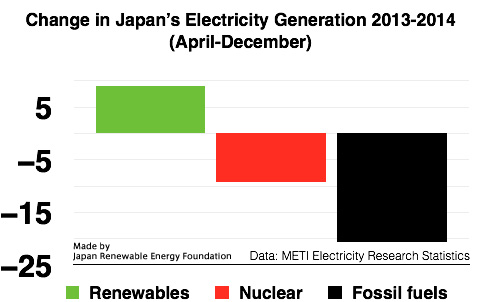Year 2014 demonstrated energy solutions in Japanese
Keiji Kimura, Senior Researcher, Japan Renewable Energy Foundation
The year 2014 was the first calendar year in 50 years that Japan had no nuclear power in operation. Electricity production from solar energy increased significantly. As a result, it proved possible to decrease the use of fossil fuels in Japan in 2014. The drop in oil use for electricity more than compensated increased use of LNG.
Japan managed to decrease its dependence on imported fossil and nuclear fuels and got a significantly increased share of electricity from domestic renewable sources. This deserves to be celebrated. Encouraging for the future is also that the costs of remaining fossil fuel imports have fallen as international oil, gas and coal prices have dripped.
In the United States renewable energy is also developing successfully. More new, renewable generating capacity was added then gas-fired power. Renewable power increased more than 30 times as much as oil, coal and nuclear taken together.
In Germany, electricity production decreased using coal, lignite, gas and nuclear while electricity from solar, wind and biomass increased. The addition of new wind power plants in Germany was larger than in any previous year.
Most remarkable is the development in China. Renewable electricity production increased by more than 200 TWh while the electricity production from fossil fuels decreased by almost 30 TWh compared to the previous year.
Renewable energy has proven economic development is possible in the world without the negative side effects of fossil and nuclear energy.


